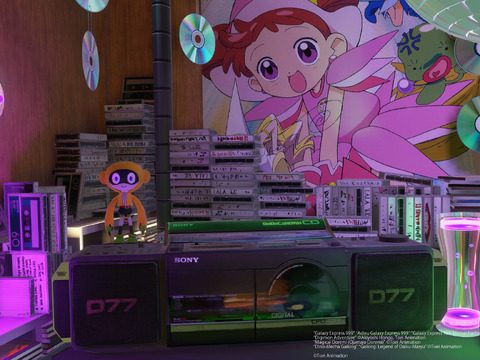Catching the virtual love bug!

When you think about the NEET lifestyle (if you think about it at all), Keima Katsuragi is usually one of the many examples that come to mind. And then there’s Moriko Morioka; a near-middle-aged woman who just quit her office job, holed herself up in her apartment, and turned to MMORPGs in the pursuit of looking for a more fulfilling life. She quickly finds something close to it in the MMORPG Fruits de Mer, where she logs in as a male character under the handle Hayashi. After a rough start, a pink-haired avatar named Lily comes to her aid. The two become fast friends, and Moriko eventually joins a guild with her. Unbeknownst to Moriko/Hayashi, however, Lily’s player is actually a guy named Yuta Sakurai. And just as fast as they met online, they suddenly find their real lives intertwining.
Right from the get-to, Recovery of an MMO Junkie (Neto-juu no Susume), the anime adaptation of the manga of the same name, distinguishes itself with its choice of protagonist. As a 30-year-old woman who’s wholeheartedly embraced her new life as a societal dropout, Moriko is a far cry from the likes of Subaru Natsuki and Kazuma Sato, especially in the way she’s portrayed. Her life’s a goddamn mess, yes, but normally this kind of character would be in high school and introduced as a complete loser. The portrayal of Moriko is very different. She’s a nerd, yes, but you never see her traits turned into over-the-top exaggerations for invoking sympathy.

A point also has to be made about how this show portrays a character with social anxiety. You can tell early on that Moriko didn’t quit her office job simply because she was bored with real life. This show adds a touch of sensitivity to her problems—she makes notes to avoid places where she flubs conversations, she freaks out over uninvited social interaction, and ultimately turns down said invitations due to the fear of being awkward. Watching Moriko navigate her problems without any form of forced exaggeration for the sake of comedy is both endearing and validating to watch.
The art doesn’t really scream high quality, and Fruits de Mer certainly doesn’t scream Hayao Miyazaki, but this show works with what it’s got, at one point even using specific visuals and wardrobe choice to give us hints about character personalities. It’s all pretty solid, for the most part. But in both worlds, though, it’s not about the art; the focus is on the emotional struggles of the characters.

As a virtual world, Fruits de Mer is a far cry from the likes of, say, Sword Art Online and Overlord. You won’t find deadly interpersonal fights or to-the-death showdowns here. On its own, Fruits de Mer is refreshing and easy to digest. At the same time, the characters recognize that the MMORPG is really just that—an MMORPG. There is reaffirmation that the virtual world and the real world are not one and the same, as the show’s camera tends to cut between the digital self and the real self, creating a stark understanding of the weirdness of it all. While you can see pieces of their handlers’ personalities, it’s clear that these avatars are being used as a chance to become someone else. No one wants to bring their emotional baggage to the virtual world, but these personalities still end up being pretty real. It just goes to show how the Internet can be both a protective and liberating environment for those who are looking for one.
 But what I really like about this show is how it handles misunderstandings, which are a huge staple in any rom-com. It might work for a short film, but it can be absolutely frustrating in long narratives (as in, every harem anime) where progress toward a tangible end is a must. MMO Junkie solves this conundrum the old-fashioned way—by simply having the characters talk and come to understand each other’s feelings. The tension is maintained thanks to tangible gaps of understanding between the characters that never get exhausted over long periods of time.
But what I really like about this show is how it handles misunderstandings, which are a huge staple in any rom-com. It might work for a short film, but it can be absolutely frustrating in long narratives (as in, every harem anime) where progress toward a tangible end is a must. MMO Junkie solves this conundrum the old-fashioned way—by simply having the characters talk and come to understand each other’s feelings. The tension is maintained thanks to tangible gaps of understanding between the characters that never get exhausted over long periods of time.
Recovery of an MMO Junkie is a refreshing change of pace from teen rom-coms where the kids are somehow practically incapable of improving their social skills. Moriko’s issues are very relatable, while the virtual life here is never glamorized or condemned; it’s just a basic human desire for relaxation and company that drives them. The message being that you don’t have to have everything completely figured out when you’re this old is an extremely comforting one, just as long as you don’t spend too much on limited-edition gift boxes.
Studio/company: Funimation/Crunchyroll
available: Now
rating: TV-14
This story appears in the April 2018 issue of Otaku USA Magazine. Click here to get a print copy.






![SSSS.Dynazenon [Anime Review] SSSS.Dynazenon [Anime Review]](https://otakuusamagazine.com/wp-content/uploads/2021/08/16-9-SSSS.Dynazenon_Key_Visual_3.5-480x360.jpg)
![Back Arrow [Anime Review] Back Arrow [Anime Review]](https://otakuusamagazine.com/wp-content/uploads/2021/07/ba15-02686-480x360.jpg)